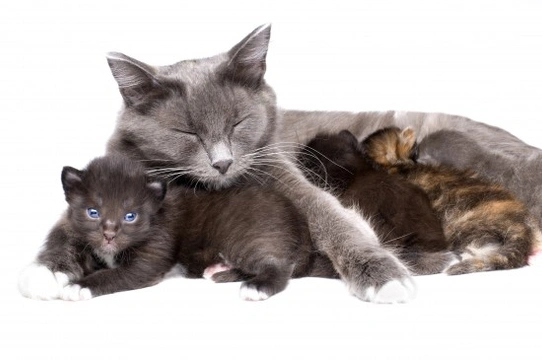
Cat Breeding - The Arrival and Early Days of your Kittens
Cats often do not have their kittens within the opening hours of your vet's surgery, so do make sure in advance that you are fully aware of how to contact your vet out of hours, should any problems occur. A vet will not be surprised to be rung in the middle of the night or at the weekend if you have serious concerns, and you should not hesitate or wait until the surgery re-opens as this time could be crucial to the well being of your queen's new family, and to the cat herself.
You will undoubtedly have the support of the breeder of your queen as well as of the stud owner, but they are not always going to be available just at the moment you need them and are probably not on hand to see the exact problem if you feel all is not going well. The majority of kittens are born without any problems at all, but sometimes the new Mum is slightly anxious, and just being there with her and reassuring her will often help. If you go to work, make sure that you book a few days off so that you will be there on the appointed day, although first litters are quite often a day or so late. In the event of it being necessary for your queen to have her kittens delivered by caesarean section, your vet may well suggest that you have her spayed at the same time, as once a cat has had a Caesarean, the chances are that she may need another one with future litters, and complications could arise. The decision is obviously yours, but do take your vet's advice seriously.
You will know that your queen is about to give birth, as you will see a slight discharge, followed by regular contractions. The chances are that you will not need to do anything at all, but she will appreciate knowing that you are there, especially if it is her first litter. As each kitten appears, the queen will clean it, breaking the amniotic sac and making sure that the kitten's nose and mouth are clear so that they can breathe properly. As soon as she has finished cleaning them up, they will start trying to feed from her, although she may not let them until she has given birth to the whole litter. But if you think she is struggling or in distress, or there is an obvious problem with a kitten, you should contact your vet immediately.
Once the kittens are all born, she will take great pride in making sure that they are all cleaned and lined up ready for their first meal. Occasionally the queen will not have any milk, or will not want to feed the new kittens, in which case you may need to step in and hand feed them using a commercially available product and a syringe - it's always as well to have a few handy from your vet in case you need to help out. Often if this happens it's because the queen has had a difficult birth and too exhausted to feed her new family, but sometimes you will need to continue with this, which means feeding them every couple of hours round the clock for the first 3 or 4 weeks, which is an enormous commitment. However, in this scenario, you may find another breeder who has a young litter who might be prepared to help you out and persuade her own queen to take them on an additional family. Cats are very maternal creatures, and often a few more will not make any difference, but you will need to move quite quickly. It's a good idea to network with your local breeders so that you can all help each other out if needed - it doesn't matter if they are different breeds. If you decide to hand rear the kittens yourself, you must make sure that you stimulate the kittens to pass any waste material, and you can do this by gently stimulating the anal area with a soft towel or cloth, replicating what the mother cat would do.
However, hand rearing or fostering with another queen is very unusual and probably everything will go to plan. Sometimes the mother cat will decide to move her kittens elsewhere, so do not be alarmed if you come home and they all seem to have disappeared. There could be a number of reasons for this - maybe the bedding needs changing as cats are fastidious creatures, or perhaps it's not dark enough or she feels threatened by your other cats. Try and persuade her back to the original area with clean bedding and plenty of her favourite food, and hopefully she will remain there until the kittens start to become mobile.
Kittens are born blind, and their eyes will not fully open until they are 7 to 10 days old - this is perfectly normal, and should give no cause for alarm. If they appear a little sticky when they first open, you can clean them by gently wiping them with cotton wool soaked in a very weak saline solution, which should do the trick. Keep a constant eye on your new kittens and check that all is well. If there appear to be any deformities or health issues such as excessive diarrhoea or sickness, or a kitten not wanting to feed, go straight to your vet. Many of these problems can be resolved if you catch them quickly, and you will soon have the fun of seeing your kittens playing and growing up.



